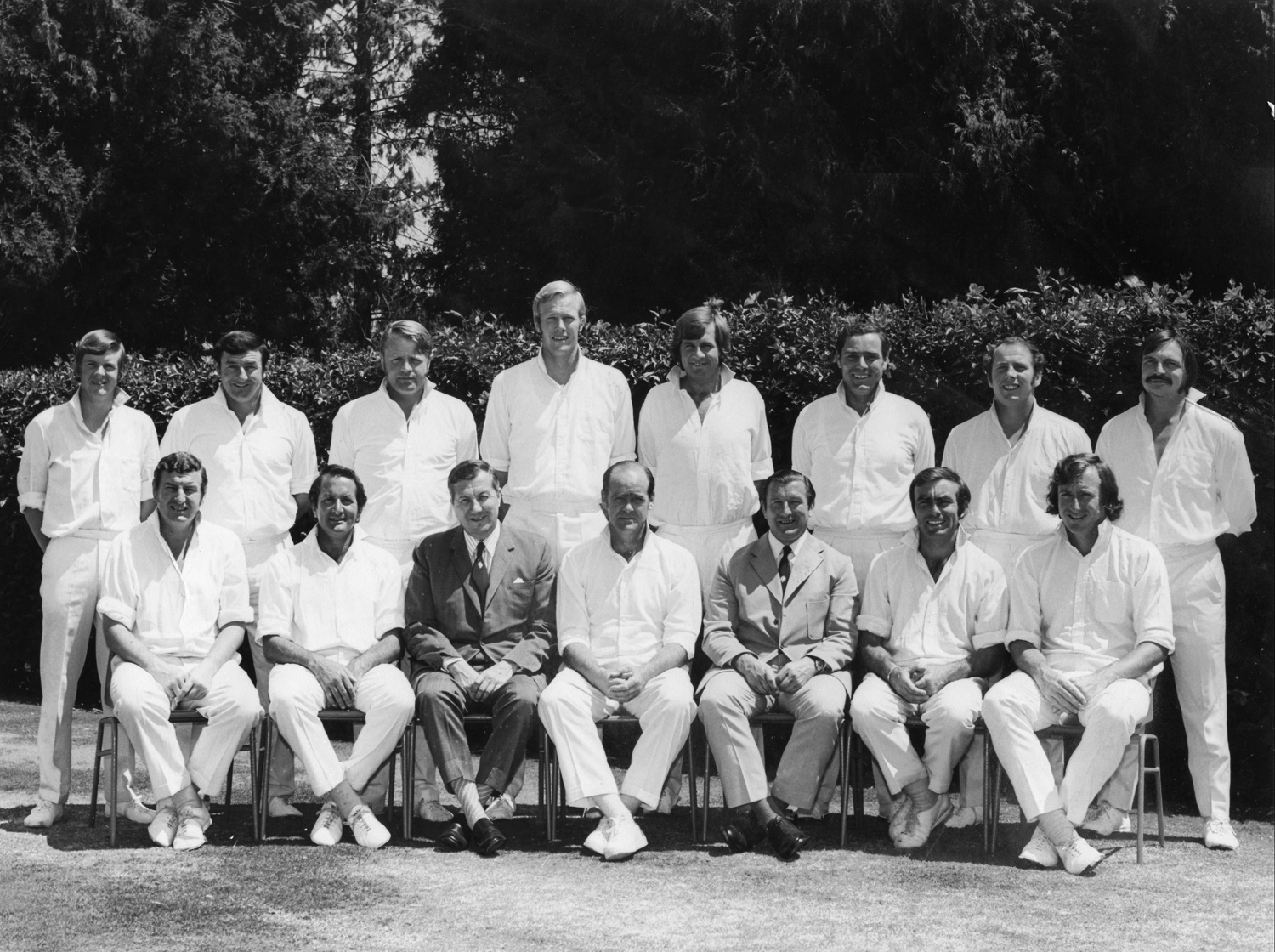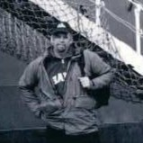International Wanderers Cricket Tour of Rhodesia in 1972
Dean Tuckwell | April 03, 2023

Back Row - Glenn Turner ( Worcester New Zealand opening batsman), Merv Kitchen (Somerset opening batsman & Test umpire), David Green (Gloucester opening batsman), Tony Greig, Bruce Francis, John Jamieson (Warwickshire and England opening batsman), Norm Gifford (Worcester and England left-arm orthodox); John Maclean (QLD and Australia wicket-keeper)
Front Row - Jim Parks (Sussex & England batsman and wicket-keeper), Basil D'Oliveira, Brian Close; John Edrich, Graham McKenzie
Former NSW & Australian opening batsman Bruce Francis toured Rhodesia (now Zimbabwe) in 1972 with The International Wanderers. The country was in the midst of a brutal civil war but The Wanderers' major concern was running into red-hot Springbok all-rounder Mike Procter who scored 99, 114 & 131 and took 4 for 20 in the 2 matches he played. Procter played 5 seasons for Rhodesia in South Africa's Currie Cup competition and had scored a world-record 6 successive centuries the previous season. Tough-as-nails former Tasmanian captain Brian Davison also starred, scoring 79, 70 & 125 in 3 matches.
Bruce's recollection has more than a hint of The Grade Cricketer about it:
Who were the International Wanderers?
Cricket festivals are held throughout the season in England where various philanthropists organised teams to play in such festivals and benefit matches. Former test selector & MCC manager Tom Pearce selected an annual XI that played against the touring test side between 1951 & 1976. Sports promotor Derek Robins took teams to New Zealand, Sri Lanka & then-apartheid South Africa and one of sport's first "super-agents" Bagenal Harvey had his International Cavaliers for whom I also played a number of matches. Frank Twistleton was the CEO of Whitfield Breweries who underwrote the International Wanderers.
Most teams contained a combination of current and past players including regulars Ted Dexter, Godfrey Evans, Derek Murray, Peter Pollock, Fred Trueman, Neil Hawke, Brian Davison and numerous Pakistanis. It was a fantastic time and opportunity to forge cricket and personal relationships with players from other countries
International tours only included current players.
Your side was very strong on paper but comprehensively outplayed by Rhodesia - could they have held their own in test cricket at that stage?
We lacked an opening bowler and were on holidays. Rhodesia played in the Currie Cup in South Africa and at that time were a very strong side. We had just finished a long English season whilst they were preparing for theirs and competition was fierce for spots in the team and for South Africa. For example Jackie du Preez was selected for South African against the touring Derrick Robins XI. Most of them were very good first class players including former England coach Duncan Fletcher who opened the batting and bowling.
That said the Rhodesians were at a huge disadvantage playing in the Currie Cup. They would tour South Africa for three weeks before returning home and re-joining their army unit for a month. They would then return to cricket for a couple of matches.
Just how good a player was Mike Procter?
Mike Procter was the most fearsome bowler I faced and although he batted about eight or nine for South Africa I would rate him amongst the best all-rounders of all time with Sobers, Kallis and Miller. He was a better bowler than Imran and Kapil Dev and a better batsman than both of them.
Besides Procter, were all the other players’ locals?
Peter Carlstein was a South African who toured Australia and New Zealand in 1963 when tragically his wife and three children were killed in a car accident forcing him to return home immediately.
Rhodesia was in the midst of a vicious civil war - Did the team need to take any peculiar safety measures?
There was seemingly no need for any safety measures as in the cities we were unaware of a war or even any perceptible animosity although shortly after we were in Victoria Falls, the freedom fighters fired a heat-seeking missile at a plane. It missed and fixed itself on the kitchen of the Victoria Falls Hotel. It made a huge mess.
What are your memories of the tour?
It was a wonderful three weeks. I flew to South Africa from England with Ian and Greg Chappell and we all had bought state of the art hearing devices to watch the in-flight film. The South African Airways budget only stretched so far as a silent movie - Greg was not a happy vegemite.
Kay and Judy Chappell caught a boat from Fremantle to Cape Town and met us in Johannesburg. We spent Jewish New Year with a number of Ian's high profile Jewish friends which was very educational. Those people are still friends today. At one of the parties in Johannesburg a woman asked Ian what their wives would say about he and Greg out with two glamours while their wives looked after the kids back home. Ian said "I don't know. Why don't you go and ask them?" The lady didn't believe Kay and Judy were their wives.
We all flew to Victoria Falls for a few days where I was too scared to join them in a six-seater plane flying over the Falls and Zambesi River. When asked by Ian why not, I said if the plane goes down I might get another game and field in my rightful spot at first slip straight behind the keeper.
Ian and Greg returned to South Africa for a double wicket competition and I joined the Wanderers who had flown in from England.
I roomed with the Rhodesian liaison officer David Pithy who had played for South Africa as had his brother Tony. Their father was or had been president of the Rhodesian Senate and as I had studied African politics at university he was my most interesting roomy.
At the time, Percy Sledge was one of my favourite singers - When a man loves a woman - and we attended his non-racial concert in Salisbury (now Harare). It is still one of my favourite concerts. Unlike South Africa, on the surface, there was no indication of animosity between the races. Everything was open.
The second first class match in Salisbury was one of the highlights of my career. I didn't play. I had scored 50 odd and 60 odd in the first match and as we had five opening batsmen in the squad I told captain Brian Close I was happy to sit out the match for which he was grateful. Not as grateful as I was for him agreeing - I spent three days sitting by the pool at the Police Ground with food and drinks brought to me every half hour. It was too stinking hot for cricket.
Rhodesia scored 270 - Procter 100 and we were 0 for 0 at stumps. The ground staff forgot to put on the covers and it pissed down overnight. From where I was watching from the pool, the wicket was a minefield. Glenn Turner was hit at least a dozen times in scoring an incredibly courageous 40 odd. We were bowled out for 120 and Rhodesia didn't enforce the follow on scoring nearly 400 in its second innings - Procter 130 and Brian Davison 120. We were left over 500 to win and just were just pipped by 411 runs. What a memory! I got a great tan listening to Neil Diamond's newest record Song Sung Blue and didn't have to field a ball. Nor did I have to face Procter on that diabolical wicket.
I found a tour memo a couple of years ago: "Each player is entitled to a 21 shilling evening meal allowance." That is two dollars and five cents Australian*
*Bruce still has his








